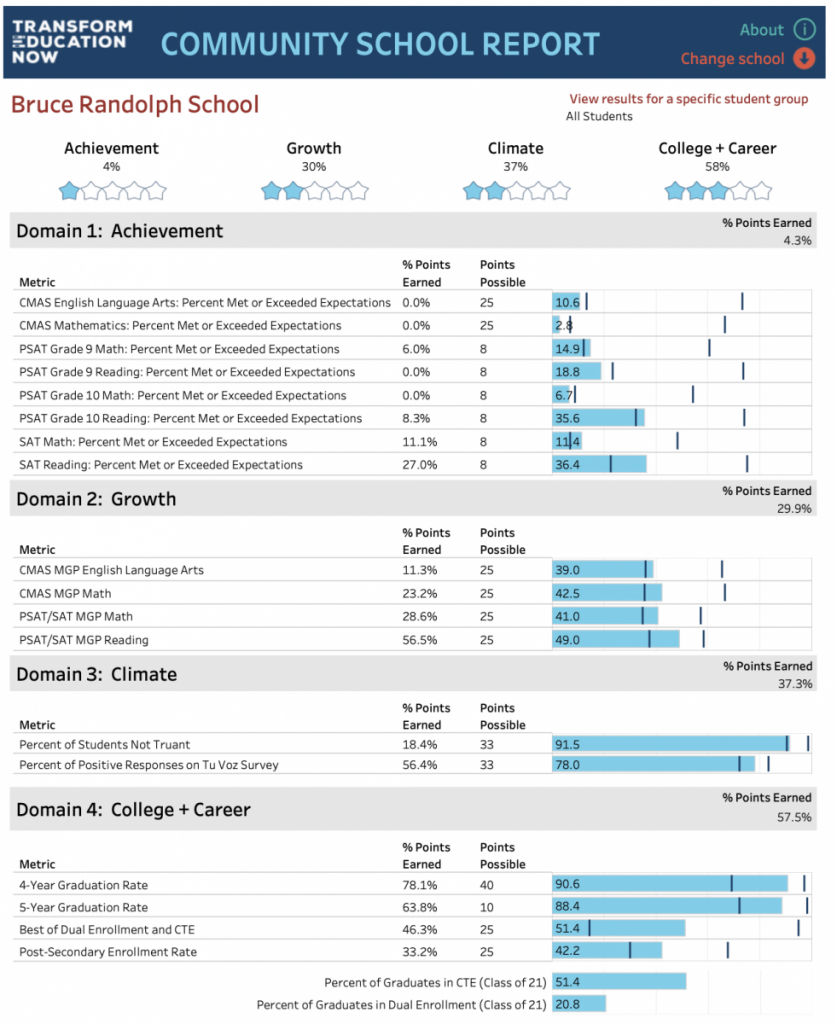Transform Education Now (TEN) believes that access to a world class education is a fundamental right of all children, which is why we champion the right for families to choose the learning environment that is right for their children.
We believe that families need to be key partners in the decision-making process for their kids and deserve access to transparent academic and school culture information so they can be empowered to make informed decisions.
School choice is a powerful lever for self-determination. Yet we also recognize the challenge working families face in trying to evaluate, visit, and ultimately decide between multiple schools, often without access to transportation support or other resources that truly allow for choice. That is why 1-1 training and community sessions around choice continue to be cornerstones of our work.
For families to truly engage in their children’s education they need full access to data and information regarding our schools.
TEN’s new Community School Report (CSR) serves to fill that gap and provide easy to access information about all students in every school in Denver Public Schools. We aspire for this report to serve as a tool for families to compare their options comprehensively, enabling them to make informed decisions and ultimately empowering them to advocate for their family’s needs.
Each school report highlights:
- the successes and challenges of each school
- a star rating for academic outcomes
- star ratings for how well the school serves different student groups
The biggest challenges facing Colorado families is transparent information about the academic outcomes of the schools they will select among.
The Colorado Department of Education’s data site is comprehensive yet not easily accessible. You are always one click away from a rabbit hole of complex equations and massive Excel spreadsheets. And even if you are able to find the information you want, if you are not fluent in edu-speak it’s often incredibly difficult to decipher information in the context of your own child.
Prior to 2019, families in Denver were able to access the DPS School Performance Framework, which served as a state leader providing transparent, high-quality information. The district SPF set a rigorous bar for excellence and acknowledged the district’s and each school’s responsibility to educate all students to the best of their ability, regardless of starting point.
The Denver SPF was not perfect. The calculations were complicated, the like-school measures needed additional work, and the “goal-posts” often seemed fluid. But it did set a rigorous goal for academic progress, it prioritized year-to-year learning for ALL students, and it clearly stated the district was built on a vision of moving towards educational equity.
The Denver SPF held schools accountable for closing achievement gaps, particularly for historically marginalized students, and to achieve the highest rating, schools couldn’t simply maintain large discrepancies in outcomes and opportunity gaps.
Its measures often compelled committed schools and school leaders to look inward and change systems and policies to make sure they were serving all students well. Today we have gaps that continue to widen year after year and more rapidly than ever before in a post-Covid era.
The DPS SPF provided much needed and demanded information about school quality for families. Yet, in 2019 the Reimagine SPF committee voted overwhelmingly to end its use.
The committee’s plan was to revamp and recreate the district enrollment guides, providing more narrative about each school’s unique offerings while rolling back information about academic outcomes.
Unsurprisingly, the board of education, which had previously expressed concerns about over-reliance on academic data, voted to accept the committee’s recommendation then stifled the effort to create even a narrative driven dashboard in its place.
Since then, families have been left without insight into the strength and struggles of schools across the district.
Yet we know that it is not enough to inform families only during transition years or during the choice process families deserve to be supported and trained to become experts in accessing and using data for community led improvement. As organizers it is our charge to empower families to be advocates who are equal partners in decision-making and school improvement so that our schools are not making decisions in silos away from our communities.
Our hope is that our Community School Reports spark local conversations about the opportunities being afforded to our students and the need for urgent improvement.
We also recognize that a score or a series of evaluations does not tell the whole story of a school. With that in mind we hope that the CSR serves as a tool in a wider tool box for families that they can use to truly evaluate their options.
The recently released Mile High School Guide from RootED provides critical context and demographic understanding of a school community. The district-published enrollment guide books are a wealth of information regarding the unique models and programs at each of our schools.
It is our hope that our CSR helps to spark questions among community members about areas of strength and areas of growth in our schools, and helps every family build the power to act on behalf of their children.




